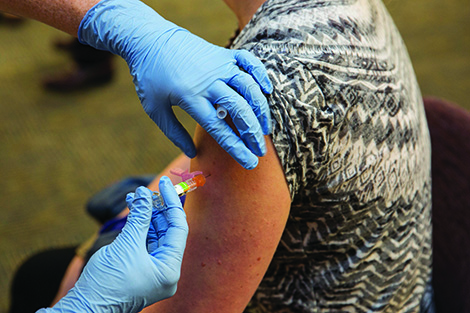How Medicare covers preventive healthcare
SAVVY SENIOR
By Jim Miller
Dear Savvy Senior,
How does Medicare cover preventive health screenings? I’m due to get a physical and a colonoscopy this year, but I want to find out what I’ll have to pay for before I go in.
Just Turned 65
Dear Just Turned,
You’ll be happy to know that Medicare covers a wide array of preventive and screening services to help you stay healthy, but not all services are completely covered.
Most of Medicare’s preventive services are available to all beneficiaries (through Part B) completely free with no co-pays or deductibles, as long as you meet basic eligibility standards. Mammograms; colonoscopies; shots against flu, pneumonia, COVID-19 and hepatitis B; screenings for diabetes, depression, osteoporosis, HIV, various cancers and cardiovascular disease; and counseling to combat obesity, alcohol abuse, and smoking are just some of Medicare’s covered services. But to get these services for free, you need to go to a doctor who accepts Medicare “on assignment,” which means he or she has agreed to accept the Medicare approved rate as full payment. Also, the tests are free only if they’re used at specified intervals. For example, cardiovascular screening blood tests once every five years; or colonoscopy once every 10 years or every two years if you’re at high risk.
Medicare also offers a free “Welcome to Medicare” exam with your doctor in your first year, along with annual “Wellness” visits thereafter. But don’t confuse these with full physical exams. These are prevention-focused visits that provide only an overview of your health and medical risk factors and serve as a baseline for future care.
Cost-sharing
There are a few Medicare preventive services that require some out-of-pocket cost-sharing. You’ll have to pay 20 percent of the cost of the service after you’ve met your $226 Part B yearly deductible. The services that fall under this category include glaucoma tests, diabetes self-management trainings, barium enemas to detect colon cancer, and digital rectal exams to detect prostate cancer. For a complete list of services along with their eligibility requirements, visit Medicare.gov/coverage/preventive-screening-services.
If you’re enrolled in a Medicare Advantage (Part C) plan, your plan is also required to cover the same preventive services as original Medicare as long as you see in-network providers.
You also need to know that while most of the previously listed Medicare services are free, you can be charged for certain diagnostic services or additional tests or procedures related to the preventive service. For example, if your doctor finds and removes a polyp during your preventive care colonoscopy screening, you will pay 15 percent of the doctor’s service fee. Or, if during your annual wellness visit, your doctor needs to investigate or treat a new or existing problem, you’ll probably be charged. You may also have to pay a facility fee depending on where you receive the service. Certain hospitals, for example, will often charge separate facilities fees when you’re receiving a preventive service. And you can also be charged for a doctor’s visit if you meet with a physician before or after the service.
To eliminate billing surprises, talk to your doctor before any preventive service procedure to find out if you may be subject to a charge, and what it would be.
Jim Miller is a contributor to NBC TV’s “Today.” Send senior questions for him to Savvy Senior, P.O. Box 5443, Norman, OK 73070, or at savvysenior.org.


